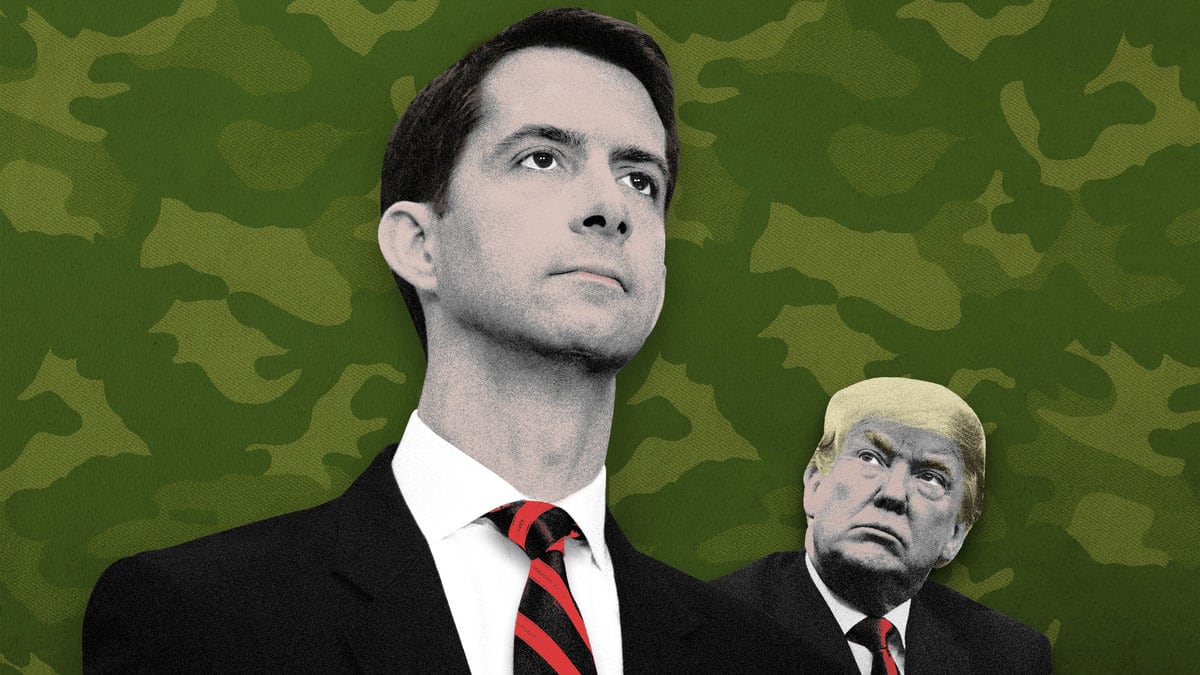When you think of Tom Cotton, you probably think of the senator who wanted to use the military to bash Black Lives Matter protesters. And when you think of the 2020 presidential election, you probably think of Republicans being complicit with Donald Trump’s attempts to overturn the election results. But that’s a little too simple.
According to David Drucker’s new book In Trump’s Shadow: The Battle for 2024 and the Future of the GOP, we should include Cotton, usually thought of as a cartoonish villainous figure by the chattering classes, as a hero of liberal democracy.
In case you’ve forgotten, in the lead up to Jan. 6, there was a push for Republicans in Congress to reject the certification of Electoral College votes for the presidential election. Senators Josh Hawley and Ted Cruz started a bidding war on who could get the most credit for pledging to object to certification. Then, at the moment when it looked like there might be a critical mass of Republicans jumping on the bandwagon, Cotton announced he would stand up against Trump’s push and support certification.
Although this earned him an immediate rebuke from Trump, at the time, many of us assumed Cotton’s actions were calculated, if counterintuitive. Perhaps he was making a bet that refusing to certify the election results would be a long-term loser, politically. Besides, Cotton might have reasoned he could never get to the right of Hawley and Cruz in a 2024 race to the bottom, so why not stake out a slightly saner niche? It turns out, though, Cotton’s motives were much nobler, as his timing was moved up to stop the movement to oppose certification from breaking through at a moment when that seemed eminently possible.
As Drucker writes, as the push for GOP Senators to vote against certification gained steam, “Cotton, in league with Senate Majority Leader Mitch McConnell of Kentucky, was maneuvering behind the scenes to derail the outgoing president’s effort to remain in office, and marginalize those Republicans who were abetting him.”
As Drucker explains, upon determining that Trump’s objections were unconstitutional, Cotton contacted McConnell, and “Together, they plotted to countermand Trump’s bid to overturn the election and neutralize interest in objecting to Biden’s victory that was developing in some quarters of the Republican conference.”
With his Southern twang, authoritarian streak, and hawkish foreign policy, Cotton seems straight out of right-wing central casting. Indeed, his New York Times op-ed calling for military troops to “restore order” amid the rioting and protests of June 2020 led to James Bennet’s forced resignation as opinion editor (in what was an overreaction by the left, that looks even worse today).
Life is complex, and heroes aren’t always 100 percent the people you think they will be. Liz Cheney and Adam Kinzinger voted for Trump and opposed his first impeachment, but emerged as heroes when the 2020 election was at stake. There is room for redemption.
To the degree Trump’s coup was viable, it was averted with the help of a lot of conservative judges and Republican politicians, such as Georgia’s Secretary of State Brad Raffensperger and elections official Gabriel Sterling—and Arizona Gov. Doug Ducey—and yes, Tom Cotton.
It seems likely that Cotton’s military background helped inform this decision. In an eerily prescient August 2015 Politico piece titled “What I Learned at War,” Cotton explained, “As soldiers advance up the chain of command, we expect them to show moral courage, which can be even more difficult. It’s easy to stay silent when a commander proposes a disastrous plan or when others engage in misconduct, but that’s not what we expect from soldiers. That’s why leaders like Drill Sergeant [George] Norton always said, ‘Do the hard right over the easy wrong.’ Just like my dad always counseled the ‘do-right rule.’”
Of course, Cotton is a crafty strategist as well as a committed constitutionalist and he went about doing the right thing in a very shrewd, strategic fashion. Odds are that a frontal assault on Trump’s power grab would have failed, rendering him politically impotent (if not unemployed). By biding his time and husbanding his conservative credibility until just the right time, Cotton dealt the greatest blow possible to Trump’s worst ambitions.
As Drucker explains, thanks to Cotton, “the number of objectors never snowballed beyond Cruz and his compatriots, Hawley, Senator Kelly Loeffler, who had been ousted the day before in one of the Georgia runoffs, and Senator Rick Scott of Florida, an aspiring 2024 contender and the incoming chairman of the National Republican Senatorial Committee.”
No wonder Sens. John Thune and John Barrasso told Drucker that “the whole thing would have gotten completely out of hand if not for the stand taken by Cotton.”
Now, there’s plenty of criticism to go around for Cotton (and McConnell) when it comes to failing to kick Trump when he was down. In the wake of his presidential defeat, the Georgia Senate losses, and the Jan. 6 insurrection (which led to his second impeachment), Republicans had the power to ensure Donald Trump could never again hold federal office. We may all soon rue their missed opportunity. Neither Cotton nor McConnell rose to the occasion on that day.
Heroes aren’t perfect. Cotton deserves credit for doing the right thing when America absolutely needed him to. While Hawley and Cruz put pandering and their presidential ambitions ahead of their country, Cotton put first things first. And for this, he deserves our gratitude.


